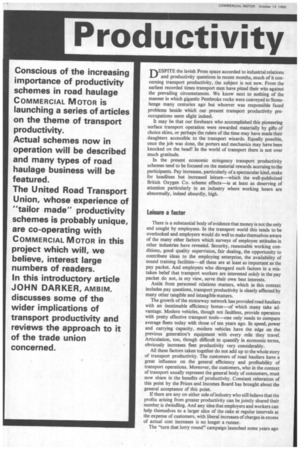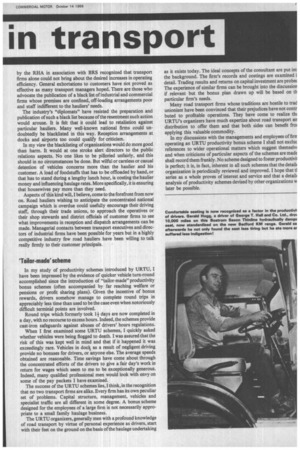Productivity in transport
Page 80

Page 81

If you've noticed an error in this article please click here to report it so we can fix it.
DESPITE the lavish Press space accorded to industrial relations and productivity questions in recent months, much of it concerning transport productivity, the subject is not new. From the earliest recorded times transport men have pitted their wits against the prevailing circumstances. We know next to nothing of the manner in which gigantic Pembroke rocks were conveyed to Stonehenge many centuries ago but whoever was responsible faced problems beside which our present transport productivity preoccupations seem slight indeed.
It may be that our forebears who accomplished this pioneering surface transport operation were rewarded materially by gifts of choice skins, or perhaps the rulers of the time may have made their daughters accessible to the transport wizards. Equally possible, once the job was done, the porters and mechanics may have been knocked on the head! In the world of transport there is not over much gratitude.
In the present economic stringency transport productivity schemes tend to be focused on the material rewards accruing to the participants. Pay increases, particularly of a spectacular kind, make for headlines but increased leisure—which the well-publicized British Oxygen Co. scheme effects—is at least as deserving of attention particularly in an industry where working hours are abnormally, indeed absurdly, high.
Leisure a factor
There is a substantial body of evidence that money is not the only end sought by employees. In the transport world this tends to be overlooked and employers would do well to make themselves aware of the many other factors which surveys of employee attitudes in other industries have revealed. Security, reasonable working conditions, good quality supervision, fair dealing, the opportunity to contribute ideas to the employing enterprise, the availability of sound training facilities—all these are at least as important as the pay packet. And employers who disregard such factors in a mistaken belief that transport workers are interested solely in the pay packet do not, in my view, serve their own best interests.
Aside from personnel relations matters, which in this context includes pay questions, transport productivity is clearly affected by many other tangible and intangible matters.
The growth of the motorway network has provided road hauliers with an inestimable efficiency bonus which many take advantage. Modern vehicles, though not faultless, provide operators with pretty effective transport tools—one only needs to compare average fleets today with those of ten years ago. In speed, power and carrying capacity, mOdem vehicles have the edge on the previous generation's equipment with every mile they traveY. Articulation, too, though difficult to quantify in economic terms, obviously increases fleet productivity very considerably.
All these factors taken together do not add up to the whole story of transport productivity. The customers of road hauliers have a great influence on the general efficiency and profitability of transport operations. Moreover, the customers, who in the context of transport usually represent the general body of consumers, must now share in the benefits of productivity. Constant reiteration of this point by the Prices and Incomes Board has brought about the general acceptance of this point.
If there are any on either side of industry who still believe that the profits arising from greater productivity can be jointly shared their number is dwindling. And any idea that employers and workers can help themselves to a larger slice of the cake at regular intervals at the expense of customers, with liberal increases of charges in excess of actual cost increases is no longer a runner.
The "turn that lorry round" campaign launched some years ago by the RHA in association with BRS recognized that transport firms alone could not bring about the desired increases in operating efficiency. General exhortations to customers have riot proved as effective as many transport managers hoped. There are those who advocate the publication of a black list of industrial and commercial firms whose premises are confined, off-loading arrangements poor and staff indifferent to the hauliers' needs.
The industry's "diplomats" have resisted the preparation and publication of such a black list because of the resentment such action would arouse. It is felt that it could lead to retaliation against particular hauliers. Many well-known national firms could undoubtedly be blacklisted in this way. Reception arrangements at docks and airports too could qualify for criticism.
In my view the blacklisting of organizations would do more good than harm. It would at one stroke alert directors to the public relations aspects. No one likes to be pilloried unfairly, and this should in no circumstances be done. But wilful or careless or casual detention of vehicles concerns more than the haulier and his customer. A load of foodstuffs that has to be offloaded by hand, or that has to stand during a lengthy lunch hour, is costing the haulier money and influencing haulage rates. More specifically, it is ensuring that housewives pay more than they need, Aspects of this kind will, I believe, come to the forefront from now on. Road hauliers wishing to anticipate the concentrated national campaign which is overdue could usefully encourage their driving staff, through their trade unions, to approach the operatives or their shop stewards and district officials of customer firms to see what improvements in reception and dispatch arrangements can be made. Managerial contacts between transport executives and directors of industrial firms have been possible for years but in a highly competitive industry few road hauliers have been willing to talk really firmly to their customer principals. • 'Tailor-made' scheme In my study of productivity schemes introduced by URTU, I have been impressed by the evidence of quicker vehicle turn-round accomplished since the introduction of "tailor-made" productivity bonus schemes (often accompanied by far reaching welfare or pensions or profit sharing plans). Given the incentive of bonus rewards, drivers somehow manage to complete round trips in appreciably less time than used to be the case even when notoriously difficult terminal points are involved.
Round trips which formerly took 1+ days are now completed in a day, with no recourse to excess hours. Indeed, the schemes provide cast-iron safeguards against abuses of drivers' hours regulations.
When I first examined some URTU schemes, I quickly asked whether vehicles were being flogged to death. I was assured that the risk of this was kept well in mind and that if it happened it was exceedingly rare. Vehicles in dock as a result of negligent driving provide no bonuses for drivers, or anyone else. The average speeds obtained are reasonable. Time savings have come about through the concentrated efforts of the drivers to give a fair day's work in return for wages which seem to me to be exceptionally generous. Indeed, many qualified professional men would look with envy on some of the pay packets I have examined.
The success of the URTU schemes lies, I think, in the recognition that no two transport firms are alike. Every firm has its own peculiar set of problems. Capital structure, management, vehicles and specialist traffic are all different in some degree. A bonus scheme designed for the employees of a large firm is not necessarily appropriate to a small family haulage business.
The URTU organizers, generally men with a profound knowledge of road transport by virtue of personal experience as drivers, start with their feet on the ground on the basis of the haulage undertaking as it exists today. The ideal concepts of the consultant are put int the background. The firm's records and costings are examined i detail. Trading results and returns on capital investment are probe( The experience of similar firms can be brought into the discussion if relevant but the bonus plan drawn up will be based on th particular firm's needs.
Many road transport firms whose traditions are hostile to trad unionism have been convinced that their prejudices have not contr buted to profitable operations. They have come to realize au URTU's organizers have much expertize about road transport an distribution to offer them and that both sides can benefit froi applying this valuable commodity.
In my discussions with the managements and employees of firn operating an URTU productivity bonus scheme I shall not excluc references to wider operational matters which suggest themselv( and when criticisms of particular aspects of the schemes are made shall record them frankly. No scheme designed to foster productivii is perfect; it is, in fact, inherent in all such schemes that the detail( organization is periodically reviewed and improved. I hope that tl series as a whole proves of interest and service and that a detail( analysis of productivity schemes devised by other organizations w later be possible.
































































































































